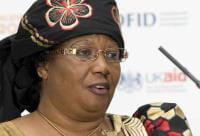Joyce Banda attributes her empowering leadership style to some difficult and humbling experiences in the early years of leading the National Association of Business Women (NABW) in Malawi.
Joyce established NABW in 1990 to help Malawian women become economically empowered. Joyce herself had suffered an abusive marriage before starting what was to become one of the largest garment manufacturers in the country. She was very concerned about what was happening to less fortunate women and so invited some colleagues to form an organisation that would act as a pressure group for women's empowerment.
Early problems
NABW was registered and grew very quickly. By 1991 there were 2,500 members. But already there were problems at the grassroots level. Joyce explains that 'sometimes people would get excited but when they did not understand what I was doing, they gave up. They left. The impact I was making was completely weak. Mobilisation was weak. Because I was seen to own the initiative, they wanted me to be the provider'. The women simply waited to be told how to do everything. The goal of empowerment was a long way from the reality of ongoing dependence.
Conflict with the Board
This led Joyce to agree with the donor to do a national needs assessment, which was announced on the radio just before a NABW Board meeting. Joyce relates what happened next: 'By the time I got to the Board meeting, they had heard the radio announcement. They were not talking to me. I asked "What is going on?" They replied, "What is going on is that we do not know what you are doing. We are not interested in continuing to work with you. Who says we need a needs assessment?" The Board meeting did not end well. I was upset. I did not apologise. Did they not understand that I was just doing my best, trying to make this organisation a success?'
Joyce went home angry. 'I felt bitter and frustrated. I was doing all I could, but the Board was not grateful. As I sat, I thought: I either have to give up or change something. I was determined not to give up - my own situation of my previous marriage made me think there must be other women out there who are not as fortunate as me, being beaten and not having the economic security to resist. So that night, I asked myself "What am I going to do? Do I look for another Board or can I change me? Can I lower myself and work with the same committee?"'
Deciding to change
As Joyce thought about it, she recognised her problem. She had not let go of control and had not shared her vision with others. She saw that she was being held back by a fear of losing power and a desire to dominate. The autocratic leadership style she was familiar with had resulted in an alienated Board and dependent women members. She describes it 'as if I had been in deep sleep and had just woken up and realised for the first time that it is not going to work if I take on things on my own'.
She decided not to have any NABW activities again until the Board had a brain-storming session to plan the future. Things soon changed.
Achieving the vision
The results of this personal shift were amazing. The most difficult Board member became her greatest support. 'Once she internalised the vision, she was more passionate than I was', Joyce said. NABW continued to grow. Most importantly, lives were being changed at the grassroots. Women scarred from repeated beatings said of their husbands 'He treats me like a partner now. He listens and we make decisions together.' Joyce describes seeing 'the greatest joy on the faces of rural business women when they feel what they have done is their initiative'. Seven years after starting NABW, Joyce was able to take a rare step for a founder leader: she retired graciously and handed over NABW leadership to a new director. NABW now has 30,000 members.
Rick James interviewed Joyce for his report 'Leaders changing inside-out'. Joyce Banda is now Vice-President of Malawi.










